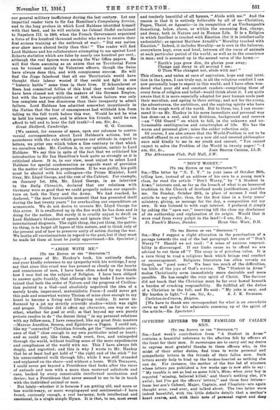" ABIDE WITH ME."
(To 77E EDITOR OF THE " SPECTATOR."I Srit,—A propos of Mr. Hankey's book, his untimely death, and your kindly reference to my sympathy with his writings, I may say that since this cruel war has pressed so closely on the hearts and consciences of men, I have been often asked by my friends . how I now, feel on the subject of Religion. I have been obliged to answer quite frankly, that although in my books I have main- tained that-both the order of Nature and the progress of Civiliza- tion pointed to a God—and absolutely negatived the idea of a merely brute, impersonal, materialistic Force—I could never get this pale and somewhat watery Theism of mine clew enough to my heart to become a living and life-giving reality. It never in- fluenced by a jot my strictly scientific studies—which was right and proper. Neither did it affect my character, one way or an- other, whether for good or evil; so that beyond my own purely private resolve to do "the decent thing" in my personal relations with my fellow-men, I have remained, like my great Stoic masters —Marcus Aurelius, Seneca, and Epietetus—a Pagan. I could not, like my "converted" Christian friends, get the "immediate assur- ance of God" close enough to my own particular mind or heart; and so could not, like them, walk erect, free, and unimpeded through the world, without trailing some of the mere expediencies and compliances of the world with me. This I have always felt deeply, and regretted; and this is why I wrote to Mr. Hankey that he at least had got, hold of "the right end of the stick" for his unencumbered walk through life; while I was still stranded and orphaned on the shore—and without a home. With Tennyson, I could never get beyond a PrOvidence that looks after the races of animals and men with a more than maternal solicitude and care, backed by every conceivable intellectual mechanism and device; but a Providence that never seemed to me to be in touch with the individual animal or man.
• But lately—whether it is because / am getting old, and more or less world-weary, or more weeping.eyed and. sentimental—I have found, curiously enough, a real harmony, both intellectual and emotional, in a single simple Hymn. It is that, to me, most sweet and tenderly beautiful of all hymns, "Abide with me." And the reason is that it is entirely believable by all of us—Christian, Pagan, Theist, or Agnostic—in its recognition of an Unchangeable Something, below, above, or within the unceasing flux, change, and decay, both in Nature and in Human Life. It is a Religion in which Intellect is touched with Emotion (for it is intellectually undeniable); as against Matthew Arnold's "Morality touched with Emotion." Indeed, it includes Morality—as is seen in the balances, everywhere kept, even and level, between all the races of animals at each particular period of the world; as well as in the conscience in man; and is summed up in the second verse of the hymn :— " Earth's joys grow dim, its glories pass away; Change and decay in all around I see : 0 Thou Who changest not, abide with me!"
This climax, and union at once of aspiration, hope and real intui- tion in the hymn, I can truly say, is all the religious comfort I can now personally hope to expect in this world; and I have often won- dered what your old and constant readers—comprising those of every form of religion and belief—would think about it. I am quite aware that it is more especially adapted for poor human souls past their meridian, and ageing to their setting; and not for the young, the adventurous, the ambitious, and the aspiring spirits who have to do the rough work of the world. But to these, too. I can recom- mend it—as Mr. Mulkey in his more immediate and personal way has done—as a real, and not fictitious, background and reserve —an "Old Guard" on which to fall, in the unknown and un- foreseeable contingencies and catastrophes of life. His has the warm and personal glow; mine the colder reflection only.
Of course, I am also aware that the World-Problem is not to be settled offhand in an article—as a now old and revered philosopher once said kindly to me in my youth and conceit, "You cannot expect to solve the Problem of the World in twenty pages! "—I


































 Previous page
Previous page